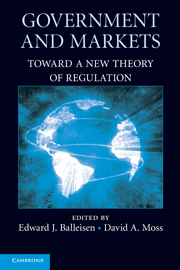Book contents
- Frontmatter
- Contents
- Acknowledgments
- Contributors
- Introduction
- SECTION I BEYOND MARKET FAILURE
- 1 Government Failure vs. Market Failure: Principles of Regulation
- 2 Effective Regulation through Credible Cost-Benefit Analysis: The Opportunity Costs of Superfund
- 3 From “State Interference” to the “Return to the Market”: The Rhetoric of Economic Regulation from the Old Gilded Age to the New
- 4 Lessons from Europe: Some Reflections on the European Union and the Regulation of Business
- 5 Confidence Games: How Does Regulation Constitute Markets?
- SECTION II BEYOND THE ECONOMIC THEORY OF POLITICS
- SECTION III BEYOND COMMAND AND CONTROL
- Conclusion
- Index
- References
3 - From “State Interference” to the “Return to the Market”: The Rhetoric of Economic Regulation from the Old Gilded Age to the New
Published online by Cambridge University Press: 20 January 2010
- Frontmatter
- Contents
- Acknowledgments
- Contributors
- Introduction
- SECTION I BEYOND MARKET FAILURE
- 1 Government Failure vs. Market Failure: Principles of Regulation
- 2 Effective Regulation through Credible Cost-Benefit Analysis: The Opportunity Costs of Superfund
- 3 From “State Interference” to the “Return to the Market”: The Rhetoric of Economic Regulation from the Old Gilded Age to the New
- 4 Lessons from Europe: Some Reflections on the European Union and the Regulation of Business
- 5 Confidence Games: How Does Regulation Constitute Markets?
- SECTION II BEYOND THE ECONOMIC THEORY OF POLITICS
- SECTION III BEYOND COMMAND AND CONTROL
- Conclusion
- Index
- References
Summary
Democracies have perennially faced questions regarding whether, what, when, why, and how to regulate. Fruitful reflection on the subject of economic regulation falls squarely within the larger context of longstanding conversations in the United States and the Atlantic world about the optimal relationship between market and state, economy and polity, individual and society. In such discussions, social thinkers have never conceived of their ideal constructions of these relations as matters involving considerations of economic efficiency alone, though some discourses have certainly pushed the conversation in that direction. In the U.S. case, discussions along these lines have questioned what arrangements of these boundaries and what particular forms of regulation were most likely to sustain virtue in politics, to reduce inequality of income and wealth, to enable full development of individual talents, and to promote realization of aspirations toward fuller democracy. The state-society boundary – and thus our thinking about economic regulation – has a history. Conceptions of “the best” social arrangements, approaches to political economy, and visions of individual liberty have diverged from one era to the next.
This essay assumes that the rich and diverse traditions of thought and practice regarding regulation in the United States have been formed in relation to five major factors: theoretical developments in relevant fields of political, social, and economic knowledge; popular beliefs – often formulated and expressed in social and political movements; previous regulatory policy decisions that have defined specific paths and foreclosed others; prevailing and emergent structures of political power and cultural authority; and the evolution of U.S. liberalism in relation to alternatives to the right and left on the ideological spectrum.
- Type
- Chapter
- Information
- Government and MarketsToward a New Theory of Regulation, pp. 92 - 142Publisher: Cambridge University PressPrint publication year: 2009
References
- 1
- Cited by



